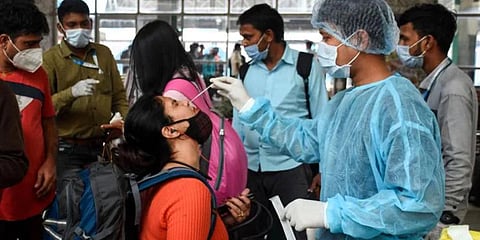

BENGALURU: In the next seven to 10 days, the number of people reporting the Omicron variant of Covid-19 is expected to increase as preliminary evidence suggests it is more transmissible than other variants, said Dr Subramanian Swaminathan, Senior Consultant, Infectious Diseases, Gleneagles Global Health City. He was speaking at a webinar titled, ‘Dealing with the Unpredictable: The Covid Crossroads’.
“The speed at which it is spreading is mind-boggling. It can reinfect 40% of people, as compared to Delta, which is at 8%. There is an increased risk of infection but severity remains unclear. In other countries, it has caused severe illness in the unvaccinated and undervaccinated,” Dr Swaminathan said, adding it is doubling at a fast pace. He said the third wave has started everywhere, including in India, and that the country will need to increase genomic sequencing for the next two weeks.
Dr Randeep Guleria, director of AIIMS, New Delhi, agreed with him, saying that India is seeing the beginning of the third wave.”If cases of Omicron are high and hospitalisation rate is said to be low, in absolute numbers the number of hospitalised people will still be high. This will lead to panic among people to block beds and get admitted even for mild disease. This will be the next challenge,” Dr Guleria stated.
The panel said booster doses would be required for priority groups. Dr Swaminathan said data from Israel shows that re-vaccination is good as vaccines wane over time and booster doses will prove to be beneficial. Natural immunity does add teeth to vaccine immunity, he added.
However, Dr Guleria said they need more data on booster doses, as there are people who have taken a third dose and still contracted Omicron. “Priority groups such as healthcare workers can get the booster, and data says mixing and matching vaccines is better. We need to test vaccine efficacy against Omicron, before rolling out boosters,” Dr Guleria shared, adding that vaccines can be tweaked according to emerging variants.